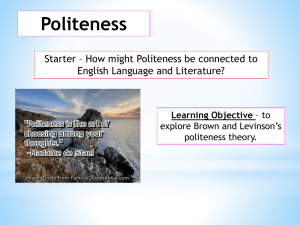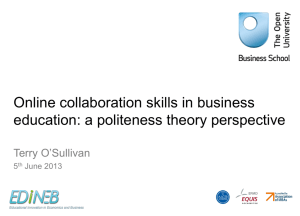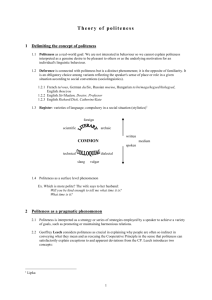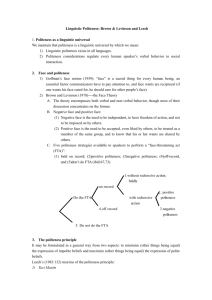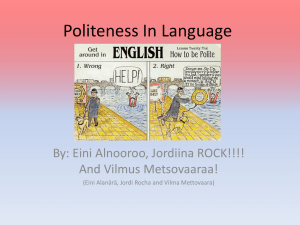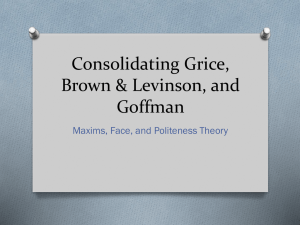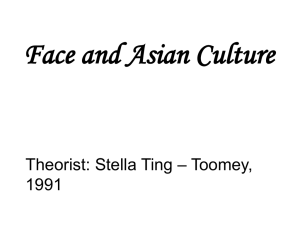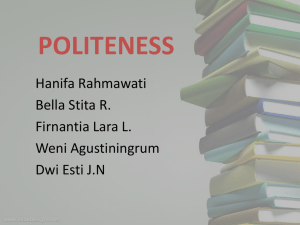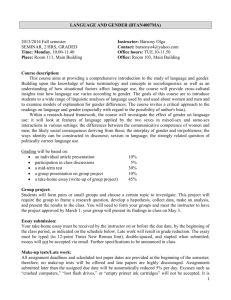PDF (Halaman depan)
advertisement
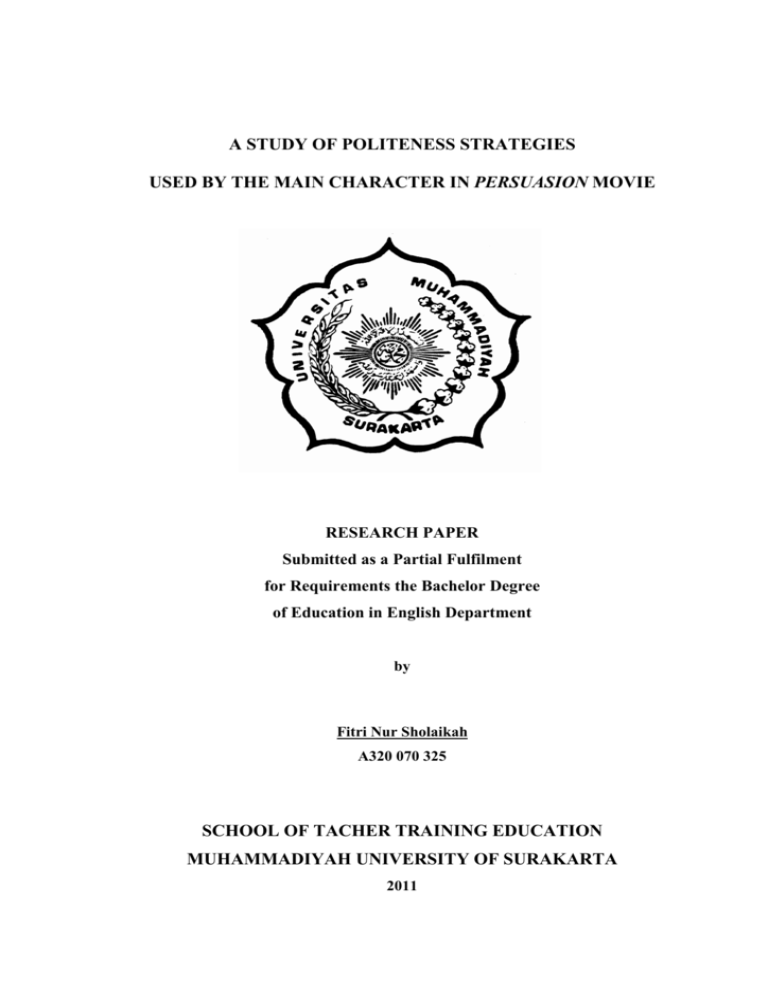
A STUDY OF POLITENESS STRATEGIES USED BY THE MAIN CHARACTER IN PERSUASION MOVIE RESEARCH PAPER Submitted as a Partial Fulfilment for Requirements the Bachelor Degree of Education in English Department by Fitri Nur Sholaikah A320 070 325 SCHOOL OF TACHER TRAINING EDUCATION MUHAMMADIYAH UNIVERSITY OF SURAKARTA 2011 APPROVAL A STUDY OF POLITENESS STRATEGIES USED BY THE MAIN CHARACTER IN PERSUASION MOVIE RESEARCH PAPER by FITRI NUR SHOLAIKAH A.320070325 Approved by Consultants Consultant I Consultant II Prof. Endang Fauziyati, M.Hum. Anam Sutopo, S.pd. M. Hum. ii ACCEPTANCE A STUDY OF POLITENESS STRATEGIES USED BY THE MAIN CHARACTER IN PERSUASION MOVIE Accepted by the Board of Examiners School of the Teacher Training and Education Muhammadiyah University of Surakarta On November 25, 2011 Team of Examiners: 1. Prof. Endang Fauziyati, M.Hum. ( ) ( ) ( ) Member I 2. Anam Sutopo, S.pd. M.Hum. Member II 3. Drs. Maryadi, M. A. Member III Dean Drs. H. Sofyan Anif, M. Si. NIK 547 iii MOTTO There, the (only) protection comes from Allah, the True One. He is the Best to reward, and the Best to give success. - 18:44 - This worldly life resembles a passageway, and the Hereafter resembles the homeland, and indeed the wishes of pious men are directed toward the homelands. - ibn Qayyim Al-Jauziyah – iv DEDICATION This research paper is dedicated especially to: my lovely father and mother, for everything which have been gave to me. May Alloh changes it for you, My lovely husband, Ahmad Rofik or Pak Ustadz, my brother, that I always pray you will become sholeh person my big family, and all of my friends who always support me that I can’t mention it one by one. v ACKNOWLEDGEMENT Assalamu’alaikum Wr. Wb. In the name of Allah SWT, the most gracious and merciful. The writer would like to thank to Allah SWT, because of this mercies and blessing she can finish writing her research entitled “A Study of Politeness Strategies Used by the Main Character in Persuasion Movie”. In conducting this research, the writer gets some helps from many people. On this occasion, the writer would like to express her great gratitude and appreciation to: 1. Drs. H. Sofyan Anif, M. Si. as the Dean of School of Teacher Training and Education of Muhammadiyah University of Surakarta, 2. Titis Setyabudi, S. Si. as the chief of English Department, 3. Prof. Endang Fauziati, M. Hum. as the first consultant who has patiently, sincerely, and wisely to give advice and guidance to him from the beginning up to the completion of this research paper, 4. Anam Sutopo, S.Pd. M. Hum. as the second consultant who has patiently and kindly given additional idea, advice, correction, help and guidance to him from the beginning up to the completion of this research paper, 5. All the lecturers at English Department of Muhammadiyah University of Surakarta for the useful knowledge and wisdom, 6. Her beloved parents and husband who always patiently pray and support the writer, 7. Her younger brother who always supports her by giving fun every day, 8. All my friends in English Department who have given me such inspirations vi 9. All of the brothers and sisters in ta’lim who have support and give me a prayer, The writer realizes that this research paper is still far from being perfect, so all suggestion and positive criticisms to make this research paper better are welcome happily. Surakarta, November, 2011 Fitri Nur Sholaikah vii TESTIMONY In this opportunity, I state that there is no proposed work before in this research to get bachelor degree in a certain University and as long as I know, there is also no work or idea that have ever been written or published by other people, except referred written in this research paper and mentioned in the bibliography. If it is proved there will be something wrong in my statement above in the future, I will wholly be responsible. Surakarta, November Fitri Nur Sholaikah A320 070 325 viii , 2011 SUMMARY FITRI NUR SHOLAIKAH. A320070325. A STUDY OF POLITENESS STRATEGIES USED BY THE MAIN CHARACTER IN PERSUASION MOVIE. Research Paper. Muhammadiyah University of Surakarta. 2011. This study focuses on of politeness strategies found in Persuasion movie using Leech’s theory. Someone should know how to use politeness strategy when they speak politely in English, because politeness universally exists but it is culturally bound. Therefore, the speakers and users of the language must be equipped with politeness formulas in speaking and must be aware of how to use politeness in different communicative acts in their daily life. It is purposed in making them to be able to communicate with the right language like where the language comes from. This research aims to investigate the following questions: (1) the types of politeness strategy are used by the main character, (2) to classify types of speech act contribute to the choice of politeness strategy, (3) to determine type of pragmatics scales contribute to the determining the degree of politeness? This research is a qualitative method. The data of this research are the excerpts of conversation which are produced by the main character with other characters containing politeness strategy in Persuasion movie. The collected data are analyzed by determining the type of speech act in each utterance. Then, the data are determined its type of maxim of politeness strategy based on the theory. Finally the degree of politeness used by the main character is determined using the measurement of pragmatics scale. The last, conclusion is drawn. The result of the study those are, 1) there are six maxims of politeness strategies which are used by the main character in Persuasion movie. Those six maxims are tact maxim, generosity maxim, approbation maxim, modesty maxim, agreement maxim and sympathy maxim. 2) there are four types of speech act which are applied in every maxim of politeness strategies, the first is commisive which is applied in politeness strategy of tact and generosity maxim, second is directive which is applied in politeness strategy of tact and generosity maxim, third is expressive which is applied in politeness strategy of approbation, modesty and sympaty maxim, and the last is assertive/ representative which is applied in politeness strategy of agreement maxim, 3) furthermore, the result shows that the main character of Persuasion movie follows the measurement of pragmatic scale to determine the degree of politeness strategy. Those pragmatics scales are cost-benefit, indirectness, optionality, power/ authority and social distance scale. Key words: Pragmatics, Politeness, Politeness Strategy, Maxim of Politeness Principle ix TABLE OF CONTENT TITLE ................................................................................................................. i APPROVAL ....................................................................................................... ii ACCEPTANCE .................................................................................................. iii MOTTO .............................................................................................................. iv DEDICATION ................................................................................................... v ACKNOWLEDGEMENT .................................................................................. vi TESTIMONY ..................................................................................................... viii SUMMARY ....................................................................................................... ix TABLE OF CONTENT ..................................................................................... x LIST OF TABLE ................................................................................................. ix CHAPTER I INTRODUCTION .................................................................... 1 A. Background of the Study .................................................... 1 B. Previous Study .................................................................... 4 C. Focus of the Study .............................................................. 7 D. Objective of the Study ........................................................ 7 E. Benefit of the Study ............................................................ 8 F. Research Paper Organization .............................................. 8 CHAPTER II UNDERLYING THEORY ....................................................... 10 A. Speech Act Theory ............................................................. 10 1. Notion of Speech Act .................................................... 10 2. Level of Speech Act ...................................................... 11 3. Type of Speech Act ....................................................... 12 x B. Politeness Theory ............................................................... 15 1. Leech’s Theory of Politeness ........................................ 16 2. Leech’s Maxim of Politeness ........................................ 17 C. Pragmatics Scales .............................................................. 21 CHAPTER III RESEARCH METHOD ........................................................... 25 A. Type of the Research .......................................................... 25 B. Object of the Research ........................................................ 25 C. Data and Data Source ......................................................... 25 D. Technique of Collecting Data ............................................. 26 E. Technique for Analyzing Data ........................................... 26 CHAPTER IV RESEARCH FINDING AND DISCUSSION .......................... 27 A. Research Finding ................................................................. 27 1. Types of Politeness Strategy Used by the Main character (Anne) ............................................................ 27 2. Types of Speech Act which Contribute to the Choice of Politeness Strategy .................................................... 42 3. Pragmatics Scales Contribute to the Measurement of the Degree Politeness .................................................... 60 B. Discussion ........................................................................... 72 CHAPTER V CONCLUSION AND SUGGESTION ..................................... 76 A. Conclusion .......................................................................... 76 B. Suggestion .......................................................................... 78 REFERENCES APPENDIX xi LIST OF THE TABLE Table 4.1 Tact Maxim ............................................................................... 31 Table 4.2 Generosity Maxim ..................................................................... 34 Table 4.3 Approbation Maxim .................................................................. 35 Table 4.4 Modesty Maxim......................................................................... 38 Table 4.5 Agreement Maxim ..................................................................... 41 Table 4.6 Sympathy Maxim ...................................................................... 42 Table 4.7 Type os Speech Act Contribute to the Choice of Politeness Strategy ...................................................................................... 44 Table 4.8 Directive Speech Act ................................................................. 48 Table 4.9 Commisive Speech Act ............................................................. 50 Table 4.10 Expressive Speech Act .............................................................. 57 Table 4.11 Representative Speech Act ........................................................ 59 Table 4.12 Pragmatc Scales ......................................................................... 60 Table 4.13 Cost-Benefut Scale .................................................................... 63 Table 4.14 Indirectness Scale ...................................................................... 68 Table 4.15 Optionality Scale ....................................................................... 70 Table 4.16 Power/ Authorit Scale................................................................ 70 Table 4.17 Social Distance Scale ................................................................ 71 xii
